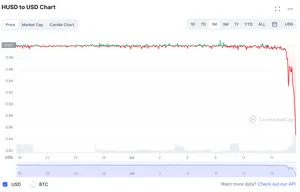HTX suspended withdrawals as they investigated the hack, and wrote that the company would "fully compensate for HTX's hot wallet losses". Security firm Cyvers said they believed the theft was enabled by a private key leak.
HTX (fka Huobi) and Heco Chain hacked for $115 million
UK's Financial Conduct Authority warns of Huobi and KuCoin
The warning list was created to notify potential users of these firms, and to inform them that losses related to the use of those platforms won't be covered by the UK's compensation scheme.
Huobi has claimed they don't operate or promote in the UK, while KuCoin gestured towards adjusting its practices in the UK. Firms on the warning list may be subjected to more serious enforcement actions in the future, including fines or even prison time.
Huobi exchange hacked for $8 million
Sun offered a bounty to the hacker to return 95% of the funds, also promising to hire them as a "security white hat advisor" for the exchange. Otherwise, he threatened to go to law enforcement.
Two weeks later, the thief returned the funds, with a note that their hot wallet key had leaked. Huobi paid the $410,000 bounty.
Rumors swirl that Huobi executives have been arrested, exchange is insolvent
Huobi and related people have been busy refuting the rumors, with Huobi's social media head dismissing them as "baseless malicious attacks". Huobi "advisor" Justin Sun tweeted "4".
Huobi patches massive vulnerability after researcher allegedly tries for a year to disclose it
According to Phillips, it took months before he was able to get in touch with Huobi and convince them to act on the leak. Phillips first notified Huobi of the leak in June 2022, and after repeated efforts to contact the company, the credentials were only revoked in June 2023.
Huobi has tried to downplay the hack, first stating that the user data leak was "on a small scale (4,960 individuals)" and "does not involve sensitive information and does not affect user accounts and fund security". They also claimed the leaked OTC data was test data. "The log shows that only [Phillips] has downloaded, and [Phillips] has also stated that he has deleted. Therefore no leakage is actually caused," they wrote.
According to CoinGecko, Huobi is the seventeenth-largest cryptocurrency exchange by volume.
Huobi Token flash crashes by 90%
Sun also announced that he had transferred $100 million to Huobi to provide more liquidity. He also announced that "Huobi will bear all leverage-through position losses on the platform resulted from this market volatility event of HT."
Although the token recovered quickly, the flash crash sparked rumors that Huobi was insolvent.
Huobi performs 20% layoff, reportedly requires employees to take salary in stablecoins
Crypto reporter Colin Wu has also reported that the company is requiring all employees to begin accepting their salaries in Tether or USDC stablecoins, or face dismissal. Rumors on Twitter emerged that internal communications channels had been shut down to quell dissent over the change.
Some crypto advocates commenting on the change maintained that there should be no difference to employees if they receive salaries in stablecoins vs. real money, but none seemed able to elucidate any legitimate reason that an exchange might find itself unable to pay salaries except in stablecoins.
At least they're not being asked to take salaries in USDD, the Tron-based stablecoin associated with Justin Sun. USDD depegged even further from its peg (which has been unstable since around October 2022), dipping to around $0.97.
Huobi exchange announces $18.1 million is locked on FTX, mostly customer funds
Gala Games tokens drained by project claiming to help them; Huobi claims the project profited
However, the Huobi crypto exchange has claimed that pNetwork's actions were not white hat, and that they profited $4.5 million from their actions. pNetwork rebutted that they had not made any money from the operation, and threatened to sue Huobi over the accusations.
Some traders who attempted to "buy the dip" and profit from the plunge in value of the GALA tokens were also upset with Huobi, when they found that the exchange had replaced their tokens with new, worthless $pGALA tokens.
HUSD stablecoin depegs
Several weeks earlier, major crypto exchange FTX announced that they had removed HUSD from their USD basket, meaning they would not be able to be used as collateral.
Huobi worked to distance itself from HUSD as the coin de-pegged, emphasizing that the token is maintained by a different entity and claiming to have exited their stake in that entity in April. However, the token was originally launched by Huobi in 2018, and Huobi has continued to run promotions involving the token as recently as July.




